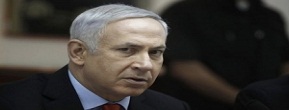Peace talks are ‘vital’ for "Israel", Netanyahu says
 Renewing negotiations with the Palestinians is “vital” for Israel, Prime Minister Benjamin Netanyahu said Saturday, after both sides agreed to lay the groundwork to resume talks frozen for three years.
Renewing negotiations with the Palestinians is “vital” for Israel, Prime Minister Benjamin Netanyahu said Saturday, after both sides agreed to lay the groundwork to resume talks frozen for three years.
“The resumption of the peace process is a vital strategic interest of the state of Israel,” he said in a statement.
“It is important on its own to try to bring an end to the conflict between us and the Palestinians, and is important because of the challenges facing us, especially from Iran and Syria,” he said.
Netanyahu’s remarks were his first reaction to the Friday night statement by U.S. Secretary of State John Kerry, who said Israeli and Palestinian negotiators had agreed to meet to pave the way for a resumption of direct peace talks.
The last round of direct talks broke down in 2010 over the issue of Israeli settlement building in the West Bank and east Jerusalem.
Netanyahu also stated the two central goals he perceived for the talks: “Preventing a bi-national state... that would endanger the future of the Jewish state, and preventing the establishment of another Iranian-sponsored terrorist state within our borders.”
He did not provide further details on what the sides had agreed upon ahead of the initial rounds of talks.
“I will insist on Israel’s security demands and its vital interests,” Netanyahu’s statement said.
Speaking on privately-owned Channel 2 television, Israeli Justice Minister and chief peace negotiator Tzipi Livni noted that while there were no preconditions to talks, “everything will be on the table.”
This would include the 1967 borders and east Jerusalem, which the Palestinians want as their future capital.
Earlier Saturday, Intelligence Minister Yuval Steinitz said Israel would release a “limited” number of Palestinian prisoners as a “gesture.”
He said the staged release would be of a “limited number” of prisoners, some of whom he defined as “heavyweights,” who have been in jail for periods of up to 30 years.
According to Israeli rights group B’Tselem, at least 4,713 Palestinians are imprisoned in the Jewish state.
Their release is one of the Palestinians’ key demands for resuming peace talks, particularly the 107 prisoners arrested prior to 1993, when the Oslo peace accords were signed.
An Israeli official said no prisoners would be released before direct talks begin, and the process would then be dependent on the Palestinians proving they are “really serious and not playing games.”
Kerry on Friday gave away very little detail of the agreement, which came after four days of consultations with Israeli and Palestinian leaders.
He said only that both sides had reached “an agreement that establishes a basis for resuming direct final-status negotiations.”
“This is a significant and welcome step forward,” he added, having doggedly pushed the two sides to agree to resume talks in six intense trips to the region since becoming secretary of state in February.
A State Department official said Kerry had wrenched a commitment from both sides “on the core elements that will allow direct talks to begin.”
The Israelis and Palestinians remain far apart on final-status issues including the borders of a future Palestinian state, the right of return of Palestinian refugees, and east Jerusalem.
Palestinian President Mahmud Abbas has also repeatedly called for a freeze to Israeli settlement building on occupied land and a prisoner release.
“The ball is now in Israel’s court,” a Palestinian official said, speaking on condition of anonymity.
“Kerry has proposed the bases for a resumption of negotiations and asked Netanyahu to respond favorably to one of them.”
“The bases are the release of Palestinians jailed before the Oslo accords, minors, the sick or the elderly,” he said. “And that Israel recognize the 1967 [border] lines as a reference point, or a halt to settlement building.”
The Islamist movement Hamas which runs the Gaza Strip rejected a return to talks, saying Abbas had no legitimate right to negotiate on behalf of the Palestinian people.
And the leftist Popular Front for the Liberation of Palestine warned that “a return to talks outside the framework of the United Nations and its resolutions would be political suicide.”-http://en.shafaqna.com
Source: Al Arabiya
Add new comment